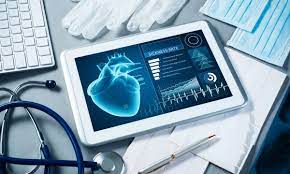The Rise of Health Technology: Transforming the Future of Healthcare
Health technology is rapidly revolutionising the way healthcare is delivered and experienced. From wearable devices to telemedicine, these innovations are not only enhancing the quality of care but also making it more accessible and efficient. In this article, we explore some of the key advancements in health technology and their impact on the healthcare landscape.
Wearable Health Devices
Wearable health devices have become increasingly popular, offering individuals real-time insights into their health metrics. Devices such as fitness trackers and smartwatches monitor heart rate, sleep patterns, physical activity, and even blood oxygen levels. This data empowers users to make informed decisions about their lifestyle and health.
Moreover, wearables can alert users to potential health issues before they become critical. For example, some devices can detect irregular heart rhythms or monitor glucose levels for diabetic patients. This proactive approach to health management helps in early diagnosis and prevention.
Telemedicine
The advent of telemedicine has been a game-changer in providing healthcare access to remote areas. Patients can now consult with healthcare professionals from the comfort of their homes via video calls or online platforms. This not only saves time but also reduces the burden on healthcare facilities.
Telemedicine has proven especially valuable during times when physical distancing is necessary, ensuring continuity of care without compromising safety. It also facilitates easier follow-up appointments and management of chronic conditions.
Artificial Intelligence in Healthcare
Artificial Intelligence (AI) is playing an increasingly significant role in healthcare by enhancing diagnostic accuracy and personalising treatment plans. AI algorithms can analyse vast amounts of data quickly, identifying patterns that may be missed by human eyes.
For instance, AI-powered imaging tools are being used to detect anomalies in medical scans with high precision. Additionally, AI-driven predictive analytics assist doctors in anticipating patient needs and outcomes based on historical data.
Electronic Health Records (EHRs)
The transition from paper-based records to Electronic Health Records (EHRs) has streamlined patient information management across healthcare systems. EHRs provide a comprehensive view of a patient’s medical history, facilitating better coordination among different healthcare providers.
This digital transformation not only improves efficiency but also enhances patient safety by reducing errors associated with manual record-keeping. Patients benefit from more personalised care as practitioners have immediate access to critical information.
The Future Outlook
The future of health technology holds immense potential for further innovations that could transform healthcare delivery even more profoundly. Developments such as virtual reality for pain management or robotic surgery are already on the horizon.
As these technologies continue to evolve, it is crucial for stakeholders—including policymakers, practitioners, and patients—to collaborate effectively in order to maximise benefits while addressing ethical considerations such as data privacy and security.
Conclusion
The rise of health technology signifies a promising future where healthcare is more efficient, accessible, and personalised than ever before. By embracing these advancements responsibly, we can look forward to improved outcomes for patients worldwide while overcoming traditional barriers within the system.
8 Essential Tips for Navigating Health Technology Safely and Effectively
- 1. Stay informed about the latest health technology advancements.
- 2. Use wearable devices to track your fitness levels and monitor your health metrics.
- 3. Utilize telemedicine services for convenient access to healthcare professionals.
- 4. Be cautious about the accuracy and reliability of health apps and devices.
- 5. Safeguard your personal data when using health technology platforms.
- 6. Seek professional advice before making significant health decisions based on technology results.
- 7. Stay updated on cybersecurity measures to protect your health information online.
- 8. Incorporate a healthy balance between traditional healthcare practices and modern health technologies.
1. Stay informed about the latest health technology advancements.
To optimise your healthcare experience, it is essential to stay informed about the latest advancements in health technology. By keeping up-to-date with the latest innovations, you can gain insights into new tools and resources that may enhance your well-being and improve the quality of care you receive. Being aware of emerging technologies allows you to make informed decisions about incorporating them into your healthcare routine, ultimately empowering you to take control of your health and well-being proactively.
2. Use wearable devices to track your fitness levels and monitor your health metrics.
Utilising wearable devices to monitor fitness levels and track health metrics is a valuable tip in leveraging health technology for personal well-being. These devices, such as fitness trackers and smartwatches, provide real-time data on heart rate, physical activity, sleep patterns, and more. By regularly monitoring these metrics, individuals can gain insights into their overall health status and make informed decisions to improve their lifestyle. Wearable technology empowers users to set achievable fitness goals, stay motivated, and proactively manage their health by detecting any deviations from normal patterns early on.
3. Utilize telemedicine services for convenient access to healthcare professionals.
By utilising telemedicine services, individuals can conveniently access healthcare professionals from the comfort of their own homes. This innovative approach to healthcare delivery enables patients to consult with medical experts through virtual appointments, saving time and eliminating the need for physical travel to healthcare facilities. Telemedicine not only enhances accessibility to healthcare services but also ensures continuity of care, especially in situations where in-person visits may be challenging. Embracing telemedicine empowers individuals to seek timely medical advice and support, ultimately contributing to improved health outcomes and patient satisfaction.
4. Be cautious about the accuracy and reliability of health apps and devices.
It is essential to exercise caution regarding the accuracy and reliability of health apps and devices. While these technological tools can provide valuable insights into our health metrics, not all of them may deliver precise or trustworthy information. Before relying on any health app or device for medical decisions, it is advisable to research its credibility, read user reviews, and consult healthcare professionals if needed. Ensuring the accuracy of the data collected by these tools is crucial for making informed health choices and maintaining overall well-being.
5. Safeguard your personal data when using health technology platforms.
When utilising health technology platforms, it is crucial to safeguard your personal data to ensure privacy and security. By being vigilant about sharing sensitive information only with trusted and reputable sources, you can protect yourself from potential data breaches or misuse. Implementing strong passwords, enabling two-factor authentication, and regularly reviewing privacy settings are essential practices to maintain control over your personal data while benefiting from the convenience and advancements of health technology.
6. Seek professional advice before making significant health decisions based on technology results.
It is crucial to seek professional advice before making significant health decisions based on technology results. While health technology can provide valuable insights into our well-being, it is essential to consult with healthcare professionals who can interpret the data accurately and provide informed guidance. Professional advice ensures that any decisions made regarding our health are well-informed, taking into account all relevant factors and potential implications. By consulting with experts, we can make confident and informed choices that prioritise our overall well-being and long-term health goals.
7. Stay updated on cybersecurity measures to protect your health information online.
It is crucial to stay updated on cybersecurity measures to safeguard your health information when utilising health technology. As the digital landscape evolves, ensuring the security of your personal data is paramount. By staying informed about the latest cybersecurity practices and being vigilant about protecting your online health records, you can minimise the risk of potential breaches and ensure the confidentiality and integrity of your sensitive information. Prioritising cybersecurity measures is essential in maintaining trust and security in the ever-expanding realm of health technology.
8. Incorporate a healthy balance between traditional healthcare practices and modern health technologies.
It is essential to strike a healthy balance between traditional healthcare practices and modern health technologies to maximise the benefits of both approaches. While modern health technologies offer advanced diagnostics and treatment options, traditional healthcare practices often provide holistic and time-tested methods of healing. By integrating the two, individuals can access a comprehensive approach to healthcare that combines the best of both worlds, ensuring optimal well-being and improved health outcomes.


